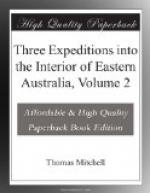A RIDGE OF POOR SANDY SOIL.
We next fell in with some undulating ground different in many respects from any that we had traversed during the morning. The soil was poor and sandy; and the stunted trees and shrubs of the Blue mountains grew upon it, instead of the novelties we expected at such a great distance from home. We also recognised the birds common about Sydney. On reaching the higher part of this ground (at nine miles) I again saw the mountain which then bore 196 degrees. The intervening ground seemed to consist of a low ridge rather heavily wooded, its crest presenting a line as level as the ocean. At eleven miles I supposed we were upon the dividing ground between the sea-coast country and that of the interior, and on what appeared to be the only connection between the forest mountains to the eastward and the lofty mass then before us. We found upon this neck huge trees of ironbark and stringybark; some fine forest-hills appeared to the eastward and distant only a few miles.
CROSS SEVERAL FINE STREAMS.
At the end of sixteen, eighteen, nineteen, twenty-one, and twenty-three miles we crossed small rivers, all flowing westward, and the third over sandstone. After passing the last or fifth stream, we halted on a very fine open, dry and grassy flat. We found a large fallen tree which we set on fire and passed the night, a very mild one, most comfortably on the ground beside it, with the intention of renewing our journey at daylight in the morning.
TRAP-HILLS AND GOOD SOIL.
July 14.
On leaving our bivouac we crossed some hills of trap-rock which were lightly wooded and covered with the finest grass in great abundance. The scenery around them, the excellent quality of the soil, the abundance of water and verdure, contrasted strangely with the circumstance of their lying waste and unoccupied. It was evident that the reign of solitude in these beautiful vales was near a close; a reflection which, in my mind, often sweetened the toils and inconveniences of travelling through such houseless regions. At the foot of the last hill, and about a mile on our way, we crossed a chain of deep ponds running to the south-west. Beyond them was a plain of the very finest open forest-land, on which we travelled seven miles; and then came upon a river with broad deep reaches of very clear water, and flowing towards the north-west. We easily found a ford and, on proceeding, entered upon a tract of white sand where banksia and casuarinae were the chief trees. There was also some good grass but it grew rather thinly upon it. The next water we crossed was a small mountain-torrent hurrying along to the eastward in a deep and rocky channel overhung with bushes.
ASCEND THE MOUNTAIN.




